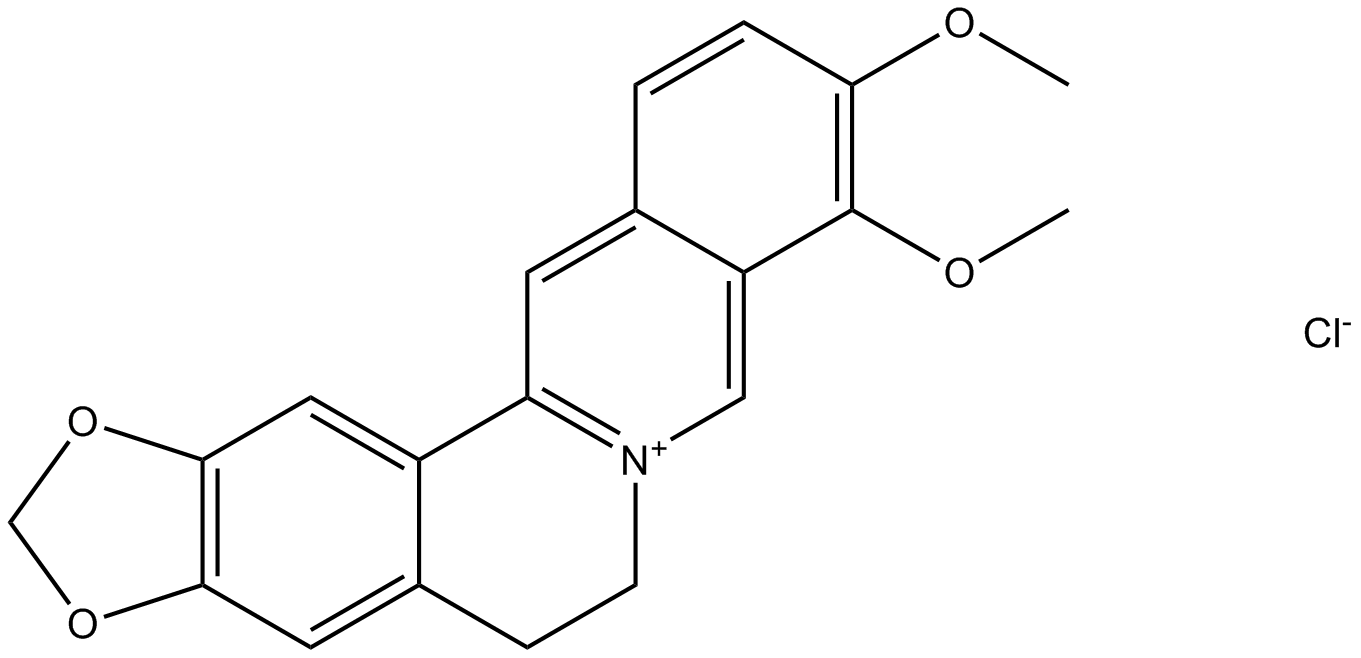Berberine hydrochloride (Synonyms: BBR, Umbellatine, NSC 163088, NSC 646666) |
| Catalog No.GN10208 |
Berberine hydrochloride is an isoquinoline alkaloid derived from the Ranunculaceae medicinal plant Coptis chinensis. It has various pharmacological activities such as anti-tumor, anti-inflammatory, and hypoglycemic activities.
Products are for research use only. Not for human use. We do not sell to patients.

Cas No.: 633-65-8
Sample solution is provided at 25 µL, 10mM.
Berberine hydrochloride is a bioactive alkaloid of the isoquinoline class derived from the medicinal plant Coptis chinensis of the Ranunculaceae family, possessing a wide range of pharmacological functions with applications in cancer, inflammation, diabetes, depression, hypertension, and various infections. Berberine hydrochloride can induce oxidative DNA damage in cancer cells[1]. It is a dual inhibitor of topoisomerase I and II and a potential autophagy modulator [2]. Due to its activating effect on AMPK, it can improve insulin sensitivity and reduce blood sugar levels [3].
In vitro, berberine hydrochloride (1.25-160μM; 72 hours) exhibits potential inhibitory effects on the proliferation of four colorectal cancer cell lines, LoVo, HCT116, SW480, and HT-29, with IC50 values ranging from 40.8±4.1 μM (LoVo) to 98.6±2.9μM (HCT116) [1]. Berberine hydrochloride (40.0μM) can induce G2/M phase cell cycle arrest, with an increase in the G2/M cell population and a progressive decrease in the G1 cell population [1]. It induces a significant increase in apoptosis in MG63 cells in a concentration- and time-dependent manner [4].
In vivo, oral doses of berberine hydrochloride at 30 and 50 mg/kg/day inhibited the growth of human colorectal adenocarcinoma xenografts in nude mice by 33.1% and 45.3%,respectively[1].Berberine hydrochloride alleviates lipopolysaccharide-induced mouse enteritis by inhibiting the activation of the NF-κB signaling pathway [5].
References:
[1] Cai Y, et al. Berberine inhibits the growth of human colorectal adenocarcinoma in vitro and in vivo. J Nat Med. 2014 Jan;68(1):53-62.
[2] Md. Reyad-ul F, et al. Berberine chloride (dual topoisomerase I and II inhibitor) modulate mitochondrial uncoupling protein (UCP1) in molecular docking and dynamic with in-vitro cytotoxic and mitochondrial ATP production.Journal of Biomolecular Structure and Dynamics. 2022 May;41: 1704-1714.
[3] J Yin, J Ye, W Jia, et al. Effects and mechanisms of berberine in diabetes treatment[J]. Acta Pharmaceutica Sinica B, 2012.
[4] Zhu Y , Ma N , Li H X ,et al.Berberine induces apoptosis and DNA damage in MG-63 human osteosarcoma cells[J].Molecular Medicine Reports, 2014, 10(4).
[5] Fu K , Lv X , Li W ,et al.Berberine hydrochloride attenuates lipopolysaccharide-induced endometritis in mice by suppressing activation of NF-kB signal pathway[J].INTERNATIONAL IMMUNOPHARMACOLOGY, 2015.
Average Rating: 5 (Based on Reviews and 30 reference(s) in Google Scholar.)
GLPBIO products are for RESEARCH USE ONLY. Please make sure your review or question is research based.
Required fields are marked with *




















